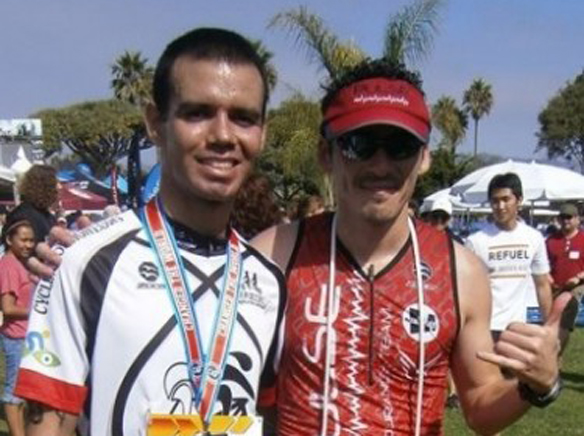It was cold and raining, but Matt Oliver said that did not bother him much. Team With A Vision runner Oliver, 26, placed 2nd in the Men’s Visually Impaired Division at the marathon. This was his first Boston Marathon.
“Once you were moving it wasn’t so bad,” he said, “but once you stopped you were freezing,” he said.
It was cold and raining, but Matt Oliver said that did not bother him much. Team With A Vision runner Oliver, 26, placed 2nd in the Men’s Visually Impaired Division at the marathon. This was his first Boston Marathon.
“Once you were moving it wasn’t so bad,” he said, “but once you stopped you were freezing,” he said.
Running the Boston Marathon is a challenge for anyone, requiring competitors to push themselves physically and mentally to make it to the finish line. For Matt Oliver of Santee, this challenge is magnified by one simple fact—Oliver is blind.
Matt was introduced to Team With A Vision through meeting team member Richard Hunter (who also ran the Boston Marathon this year) at the California International Marathon. Richard told him about the team and connected him with Team Coordinator Josh Warren.
“When I qualified,” said Oliver. “I was thinking about doing Boston, but was unsure. I wouldn’t know anyone out in Boston. Team With A Vision was really helpful with everything. It was a great time and a great experience.”
Oliver competed on Team With A Vision, a team of blind and sighted athletes that runs the Boston Marathon each year to raise funds and awareness for the Massachusetts Association for the Blind and Visually Impaired (MABVI). This was Oliver’s third marathon. His friend Jarrett Hubert acted as his “sighted guide” for the race, running alongside him to help him navigate the course.
“I started guiding VI athletes about four years ago, wanting to be involved in running and triathlon at a higher level and to help others accomplish their dreams and goals,” said Hubert. “It is an honor to be a part of something like this. I have been even more honored to run with a great athlete like Matt Oliver. We make a great team because we both push each other to strive for greatness in our performances. Most times the guide is quicker than the athlete but Matt and I are pretty equal and makes for some very interesting ends to marathons – but we keep pushing one another to train and race harder and we have both set personal PRs together in several races. I am really proud of his work ethic and the runner he has become.”
Oliver became legally blind in 2004 at age 16. He has always been active, but was more of bicyclist prior to losing his vision. In 2009 he started running to stay healthy, and while running began as a fun way for him to exercise, he later began to do races.
“Although I can’t ride bikes the way I did before,” said Oliver. “I’m glad I can have just as much fun running!”
The Massachusetts Association for the Blind and Visually Impaired has fielded Team With A Vision in the Boston Marathon for 22 years, and the 119th running of this historical event on April 20 featured many world-class athletes who are proving that with the right support, people who are visually impaired can do anything they set their minds to. The Team’s visually impaired and sighted runners participate to raise funds and awareness, and inspire others with disabilities around the globe. This year’s TWAV features growing international diversity, with runners from around the U.S., as well as Canada, France, the United Kingdom, and Hong Kong.
Some visually impaired runners are among the top competitors in any Division, and have competed in other marathons, distance races, triathlons, ultra-marathons and more. These accomplished athletes are spreading the message that disabled athletes of all kinds can compete on a world stage. Most will be competing in the Marathon’s Visually Impaired Division, one of just a handful of such divisions in the nation, and their ranks are growing.
“We’re thrilled to see our visually impaired runners and their guides featured in national and international media,” said Barbara Salisbury, CEO of Massachusetts Association for the Blind and Visually Impaired. “Boston is one of sport’s biggest stages, and these amazing athletes are proving the potential of people with disabilities everywhere.
“These runners are acutely aware that they compete to inspire others like them around the world,” said Salisbury. “They want people to know what people with disabilities are capable of, and want everyone to see our friends and neighbors with disabilities in a more positive light.”














